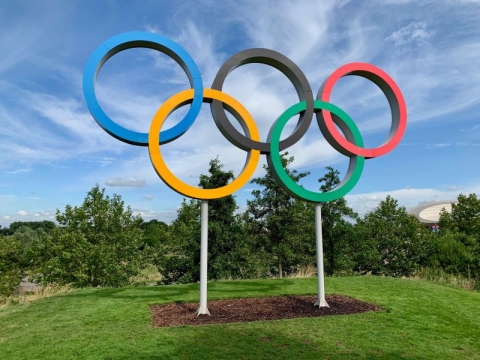

A new study advises athletes how to cope in extreme conditions
26 May 2021
3 min read
High levels of heat and humidity driven by climate change could pose a significant threat to competitors at the Tokyo Olympics in July, a new study backed by leading athletes, the British Association for Sustainability in Sport (BASIS) and scientists from the University of Portsmouth's Extreme Environments Laboratory and the Priestley International Centre for Climate at Leeds University warns.
The study: 'Rings of Fire: How heat could impact the 2021 Tokyo Olympics', hears from leading triathletes, rowers, tennis players, marathon runners and scientists advising athletes how to cope in extreme conditions.
“Olympic organisers must take the warnings in this report seriously or face a real risk of competitors collapsing through heat exhaustion,” says Mike Tipton, Professor of Human and Applied Physiology at the Extreme Environments Laboratory in the School of Sport, Health and Exercise Science at the University of Portsmouth.
“I think we’re certainly approaching a danger-zone… it’s a horrible moment when you see athletes cross the line, their bodies fling back in total exhaustion, and then not rise up,” says elite British rower Mel Wilson.

Olympic organisers must take the warnings in this report seriously or face a real risk of competitors collapsing through heat exhaustion.
Mike Tiptona, Professor of Human & Applied Physiology
The mean annual temperature in Tokyo, the capital city and host of the 2021 Olympics, has risen by 2.86°C since 1900, more than three times as fast as the world’s average. Maximum daily temperatures exceeding 35°C have become increasingly common in Tokyo since the 1990s, while a brutal Tokyo heatwave in 2018 would have been impossible without climate change, scientists say.
“The difference of 1-2 degrees on a race day will have a major impact on whether the event is safe to run,” says Ben Bright, head coach at the British Triathlon Federation.
As a result the marathon and cycling events have already been moved to cooler climes, but other sports may face safety checks before they proceed in July - while the IOC may need to integrate climate data into future venue criteria as global temperatures rise. Organisers have already admitted that heat and humidity levels in Tokyo could be a 'nightmare', with pictures of collapsed athletes at the 2019 Doha Athletics Championships fresh in the memory.
“I sincerely hope that future generations of athletes will be able to compete safely in an Olympic marathon, as I was fortunate enough to do. But more and more, heat acclimatisation will become essential, not just desirable for all marathon runners competing in hot environments,” says Mara Yamuichi, Beijing 2008 Olympics athlete and second-fastest British female marathon runner of all time.
2021 is a year of major events, with the annual COP26 UN climate summit taking place in Glasgow, Scotland this November. All countries are expected to announce tougher goals to cut the use of oil, gas and coal - although major coal user Japan is so far resisting efforts to speed a switch to cleaner fuels.
“It’s time that organisers of major global sporting events made climate impacts, as well as environmental sustainability, a core factor in deciding where and how they should be hosted. As this report shows, we can’t continue to treat climate change as a marginal concern. The risk to athletes and spectators is a central concern,” says Russell Seymour, CEO of BASIS.
